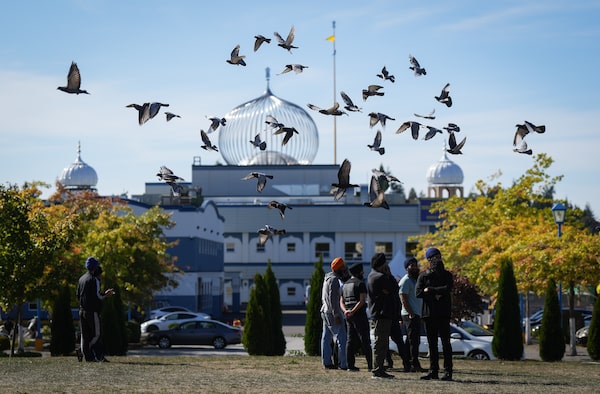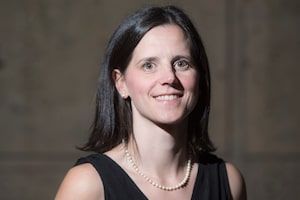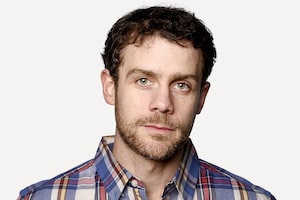
A flock of birds flies past as Moninder Singh, front right, a spokesperson for the British Columbia Gurdwaras Council, waits to speak to reporters outside the Guru Nanak Sikh Gurdwara Sahib in Surrey, B.C., on Sept. 18 where temple president Hardeep Singh Nijjar was gunned down in his vehicle while leaving the temple parking lot in June.DARRYL DYCK/The Canadian Press
The Guru Nanak Sikh Gurdwara straddles two blocks along Scott Road, in Surrey, B.C. Near the onion-domed Sikh temple, the oldest and largest in the city, is an Indian chaat house, an Indo-Fijian supermarket and a mosque, evidence of the diverse and sizable South Asian community that has lived in Surrey’s Newton neighbourhood for decades.
The proximity of all these different cultures, here and elsewhere in the country, has made this week’s news especially painful for many South Asian Canadians. Prime Minister Justin Trudeau announced on Monday that Canada has reason to believe that Indian government agents carried out the June killing of Hardeep Singh Nijjar, a Canadian citizen who before his death was Guru Nanak’s president and an ardent Sikh separatist.
Some members of Canada’s South Asian diaspora say they see the killing, which happened in the gurdwara’s parking lot, as a sign that rifts and rivalries that once seemed largely confined to India are making their way to this country.
“Whatever happens in India spills over into the diaspora,” said Surrey radio broadcaster Gurpreet Singh, who immigrated to Canada from India in 2001. The separatist Khalistan movement, with its goal of establishing an independent state for India’s Sikh minority, had all but died out until a few years ago, he added.
“Why has Khalistan suddenly become so lively? It is a reaction to what is going on in India,” he said, referring to the policies of Indian Prime Minister Narendra Modi’s Hindu nationalist government. “The more Modi oppresses minorities in India, the more those being oppressed react.”
In this atmosphere, extremist and inflammatory voices drown out those of moderates, Mr. Singh said. “It’s suffocating. It’s heartbreaking. It’s frightening. This is not the same India anymore. The diaspora will reflect that.”
In Ontario, along Brampton’s Guru Nanak Street, named for the founder of Sikhism, many said Sikh persecution by Indian authorities has a long and violent history, and that an allegation of Indian involvement in a killing on Canadian soil was not surprising.
“The local Sikh community has talked about foreign interference from India for decades,” explained Gurpartap Singh Toor, a member of the local city council who represents the area around Guru Nanak Street. “It felt like those concerns were dismissed as conspiracies. But now, finally, we feel validated. We feel seen and heard. At the same time, we’re as cautious as ever.”
The mood was uneasy across town at BLS International, a processing centre for Indian visas, where a line of more than 50 people snaked around the building. As tension over Mr. Nijjar’s killing mounted this week, India announced that it was suspending all visa services for Canadians. This spread confusion among would-be travellers and caused some to worry that further travel restrictions would be imposed.
“You see what’s going on here?” said Varun Sharma, one of the people in line. “Everyone is tense that they won’t be able to get home.”
Mr. Sharma and his wife drove five hours from Windsor, Ont., and lined up at 6 a.m. to apply for an Overseas Citizen of India (OCI) card, which permits a holder to live and work in India for an indefinite period of time.
“We had an appointment here for Oct. 12, but we decided to expedite the process in case they decide to cancel the OCI program,” he said. “There’s a lot of this anxiety in the community right now.”
India’s vital economic status means Canada will be the loser if crisis escalates
Mr. Sharma said rising international tensions threaten to sour relationships inside Canada. He explained that he had read that some Sikh activists are calling on Hindus to leave Canada. “As a Hindu, I’m a little afraid of that,” he said. “I have very, very close Sikh friends, but there are rogue elements trying to fuel a religious divide.”
Mr. Singh, the Surrey radio broadcaster, said he was also aware of these calls from Sikh activists.
“That’s hate speech. That’s nonsense,” he said. “But this is how different factions feed off one another, and capitalize on events to rile up their supporters and grow.”
Sandeep Singh, who owns an immigration consultancy in Brampton, said he is urging family members visiting India to return to Canada immediately, to avoid any travel problems that might arise from worsening international relations.
“I assume many others are doing the same,” he said.
Other Indo-Canadian minority groups have also taken notice of the turmoil. Chinnaiah Jangam, an associate professor of history at Carleton University, said that while many Hindus in Canada were stunned by news of India’s alleged involvement in the June slaying, members of these minority communities were anything but.
Mr. Jangam is a member of the Dalit caste, a group once deemed in India to be “untouchable” from birth. He is one of several Canadian academics and researchers who told The Globe and Mail they have been harassed and threatened by Indian diaspora groups for criticizing Mr. Modi’s policies.
Mr. Modi’s nationalism has marginalized Muslims, Christians and other minorities, and emboldened right-wing vigilantes, Mr. Jangam said. In the decade since Mr. Modi came to power, human-rights observers have documented a sharp rise in violence against minorities in India.
Mr. Jangam said he has received thousands of hateful e-mails and abusive voice messages. He has been accosted while delivering lectures. His talks have been picketed. His dean and university president have received dozens of messages calling for his firing.
He used to travel to India every year to visit his family and friends. He doesn’t know when he will return, if ever. He no longer believes it’s safe for him there. “Canada is my home now,” he said.
The real reasons Canada’s relationship with India is broken
Stephen Brown, chief executive of the National Council of Canadian Muslims, said that for several years he and others within the Muslim community have been telling lawmakers that Muslim Canadians are being targeted by Indian agents. “These are Canadians in Canada,” he said. “They shouldn’t have to be worried about people coming from halfway around the world threatening them.”
Sukh Dhaliwal, a Liberal MP who represents Surrey-Newton, the riding where the Guru Nanak gurdwara is located, said he was shaken by news of New Delhi’s alleged involvement in Mr. Nijjar’s death. “I never thought this could happen. I still can’t believe it,” he said.
His riding is 58-per-cent South Asian and majority Sikh.
He said he wants people to understand that what is happening in Canada now is not a religious fight. “There are no tensions between Sikhs and Hindus. We live in the same neighbourhoods. There are mosques, churches, temples throughout my riding,” he said. “This is a matter of Ottawa speaking out against the government of India.”
There are roughly 777,000 Sikhs in Canada, making them about 2.1 per cent of the country’s total population. In India, where the Sikh population is much larger, they make up only about 1.7 per cent.
“That terrifies India,” said Jaskaran Sandhu, a Brampton lawyer and founder of Baaz News, a website aimed at the Punjabi and Sikh diaspora. “Canada is the beacon on the hill for Sikhs globally.”
He called the Canadian government’s allegation of India’s involvement in the slaying of Mr. Nijjar a generational event, and a “wake-up call.”
“India is not what it pretends to be,” he said.
For years, Mr. Sandhu said, Ottawa ignored complaints from Canadian Sikhs, Muslims, Dalits and academics who told lawmakers that they were being attacked and intimidated by agents of India.
“The Canadian government wanted the strategic advantage of being close to India, and access to its market,” he said. “There was an enormous human cost to doing this.”
“I refuse to be afraid,” he added. “I was born and raised here. India will not silence me.”
 Nancy Macdonald
Nancy Macdonald Patrick White
Patrick White